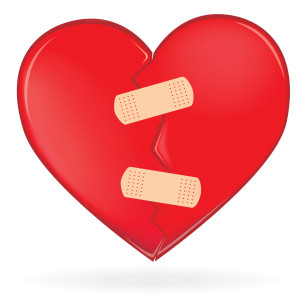 It can be extremely difficult to successfully cope after a relationship breakup. A broken heart actually can, physically, hurt. Similar to physical pain, the somatosensory cortex (controlling sensations that may occur anywhere in the body) may be activated when processing emotional pain (Kross, Berman, Mischel, & Wagner 2011). This may explain why the ending of a relationship is often a catalyst for people to seek out psychotherapy. Ironically, instead of feeling more relief after discussing the dissolution of a relationship with a psychotherapist. many people actually feel worse. Why does this occur? How do you successfully cope after a relationship breakup.
It can be extremely difficult to successfully cope after a relationship breakup. A broken heart actually can, physically, hurt. Similar to physical pain, the somatosensory cortex (controlling sensations that may occur anywhere in the body) may be activated when processing emotional pain (Kross, Berman, Mischel, & Wagner 2011). This may explain why the ending of a relationship is often a catalyst for people to seek out psychotherapy. Ironically, instead of feeling more relief after discussing the dissolution of a relationship with a psychotherapist. many people actually feel worse. Why does this occur? How do you successfully cope after a relationship breakup.
Tips on Coping After a Relationship Breakup
- Distance after a relationship breakup helps to cope: In psychotherapy, clients may be encouraged to express feelings about their breakup or why it happened. This self-immersion can lead to drudging up negative affect and “why” questions creating more distress. Research supports self-distancing techniques when clients discuss their relationship breakup (Kross, Ayduk & Mischel, 2005). For example, asking clients to discuss their breakup as though they were a “fly on the wall” allows them to get sufficient distance. They can gain insight and understand emotions rather than re-live them. Asking “why” questions under this condition can be productive. Clients can examine their experience from a more neutral perch leading to closure. In psychotherapy, work with your therapist to help gain the appropriate emotional distance from your relationship breakup. If processing feelings on your own, observing the relationships as though you were watching it as a movie rather than acting as the main character can be helpful when thinking about it.
- Coping with a relationship breakup with painkillers: As mentioned, physical pain and emotional pain affect the brain in a similar ways physiologically. Research also suggests that over the counter painkillers not only help with physical pain, but also rejection or breakups (Eisenberger, Liberman & Williams, 2003). Subjects in a study when given three weeks of over the counter painkillers versus placebo responded less intensely to social rejection they experienced. Of course, taking the recommended dosage of ibuprofen is not a long-term solution, but could be a consideration if emotional pain is acute.
- Successfully coping after a breakup through journalling: Journaling about positive things gained from the relationship breakup may be helpful. Writing about what you learned, things you have gained such as autonomy and even positive memories, has been shown to mitigate symptoms. Positive journaling helps to process thoughts and feelings, enhancing a balanced perspective. Studies indicate positive journaling can lead to wisdom, relief and empowerment (Lewandowski, 2009).
- After a relationship breakup count on social support: Your significant other was not only a sexual partner, but also likely a confidant. Relying more on friends for emotional support or activities (such as gym partners, dinners, movies etc.) can reduce loneliness and isolation. If your social support is limited, starting new hobbies or revisiting old ones can be helpful in enhancing self-esteem and confidence.
References:
Kross, E, Ayduk, O & Michel, W (2005). When asking ‘why’ does not hurt: Distinguishing Rumination from reflective processing of negative emotions. Psychological Science 16, no 9, 709-715.
Eisenberger NI, Lieberman MD, Williams KD. (2003). Does rejection hurt? An FMRI study of social exclusion. Science 302:290-292.
Lewandowski, G. W., Jr. (2009). Promoting positive emotions following relationship dissolution through writing. The Journal of Positive Psychology, 4(1), 21-31.
Kross, E, Berman, M, & Mischel, (2011). Social rejection shares somatosensory representations with physical pain. Proceedings of the National Academy of Sciences, 108, no 15, 6270-6275
